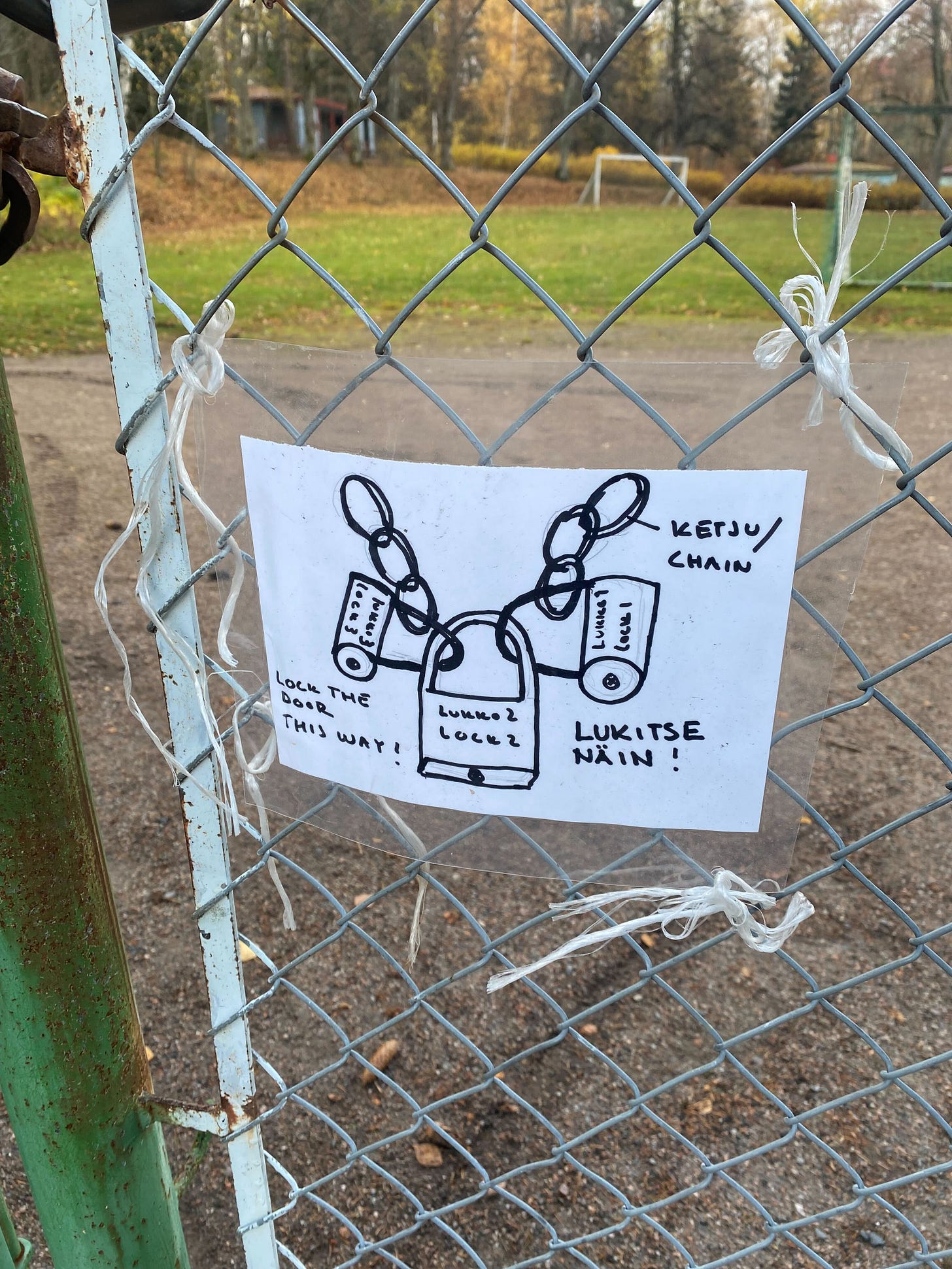Not Giving a Damn Boosts the Economy
Although I have already written about how bad processes lower unemployment, I believe the referred effect was only partially covered in that article. And I have gathered extra evidence in due time to support my claims1.
Next to where I live, there is this place where kids and teenagers learn about gardening during summer. It’s called Kumpula’s School Garden (Kumpulan koulukasvitarha) and its main gate is on my way during my evening walks with the dog. It captured my attention a while ago that the gate showcases a handwritten sign that reads “lock the door this way!” with clear instructions in Finnish and English on how to lock the gate using three padlocks (see photo below). Although there might be a good explanation why this is the recommended procedure—explanation I would love to hear—it is hard to see the logic behind it. But I will do what I do best: guess. I like to guess someone forgot to lock the door at some point, and they came up with a system of honor where every day before closing the three housekeepers are summoned to meet and lock the gate. I really want to imagine something like this happens every single summer day. But what if one of them does not show up? How long do the others wait? Too many questions unanswered.
All in all, the gate locking approach prescribed on the sign reads as if someone did not do their job in the past which the over engineered approach came to solve, and here is where the observational law kicks in. Indolent incompetence to perform as expected (that is, doing your job badly and not being arsed about it) creates economic value. How? Well, the padlock industry clearly saw a small spike in their income out of this gate locking nonsense. Where only one padlock was initially necessary, thanks to the incapacity of someone to do their job right, now there are two more padlocks than needed. Lock industry goes ka-ching.
The economy around indolent incompetence is a largely under researched topic. In times where recession and economic downturns are making lots of headlines, I rest reasonably assured: as long as there will be lazy, incompetent people out there—and it seems their supply tends to be steady and almost limitless—we are going to be just fine. Examples?
Indolent incompetence of governments to control crime shall continue creating wealth for private security agencies, house and car alarms, security cameras, pepper spray, etc.
Incompetence of governments to provide proper public transport shall continue increasing sales of cars2
Indolent incompetence of companies to define strategies by themselves shall continue enriching dubious management consulting firms
Indolent incompetence of managers to autonomously and introspectively improve upon their subordinates’ feedback shall continue incentivizing the blooming of coaches and gurus along with the crappy books they write
Indolent incompetence of companies to define and enforce good processes shall continue fueling the need of hiring ‘firefighters’ and adopting cumbersome tools
Indolent incompetence of companies to hire talent shall continue putting bread on recruitment agencies’ tables
Indolent emotional incompetence of couples to sort out their sentimental relationship issues shall continue inflating marriage therapists’ bank accounts
Note that indolent incompetence does not necessarily need to be something insulting. It refers to the combination of objective lack of competence to perform a task or resolve a problem with the objective lack of damns given to overcome such limitation. Indolence being the key here, otherwise the reader may realize—and rightly so—that there has always been economic value in assisting or helping those in need and say that what I am describing is nothing else than the service industry. I insist on the indolent bit. I am referring to a special kind of incompetence where the intellectual effort to overcome the barriers appears as too high from the eyes of the incompetent, although the barriers might be, in cases, trivial.
For example, take my own incompetence to handle a drill or repair dripping faucets and how it has given plumbers and handymen good work for ages. I am aware of my incompetence and because I do not fancy destroying walls at home, I will always rather rely on experts if I care about the result. Should I learn to handle a drill? Yes, I should. But I still don’t do it. I am indolent about it. Good news for the plumbers in the area.
You may think that, in times of recession, the feeling of indolence will vanish away and everyone will roll their sleeves and do the thing themselves instead of paying for someone else to do it. It some cases, this might be correct. If economy is bad, I might get my shit together and repair a faucet myself or drill the damn wall. Couples may try to save a dollar or two and decide not to go for a therapy that is anyway gonna blame everyone’s mom. Gardening schools may choose to educate the housekeepers better and have the redundant ones doing more meaningful things.
But the more complex things go, the harder is its to break the spell. Companies who gave consultants the power to define their strategy are trapped with them even if they should decide to wake up from their intellectual slumber and grab the bull by the horns. Governments are so heavy, slow and over engineered that it may take decades to learn how to create an efficient transportation system.
Find your way of monetizing indolent incompetence, and be ready to get rich3.
This is all tongue-in-cheek, so before you get triggered about my anthropological research methods, just relax and enjoy the moment
Some years ago the Argentina’s Minister of Transport was also the owner of one of the country’s biggest car importers…
This is not financial advice

